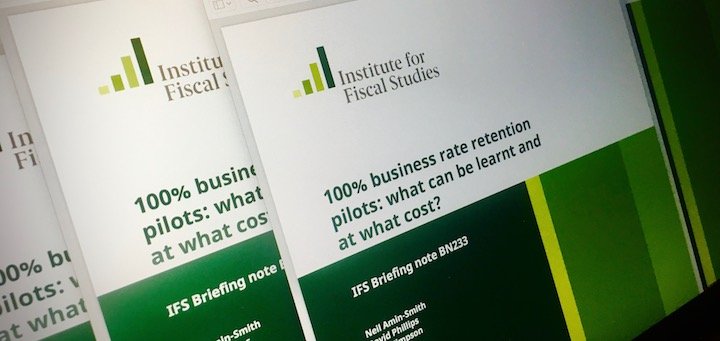 Councils included in the 100% business rate pilot scheme are set to reap £870m more next year than if they had not taken part, according to a new report.
Councils included in the 100% business rate pilot scheme are set to reap £870m more next year than if they had not taken part, according to a new report.
The study of the pilot scheme, by the Institute for Fiscal Studies (IFS), said that this adds up to a 3.6% boost to their collective spending power.
However, many in the sector warned that the government must clarify its future intentions on local government finance so that councils outside the pilots are not left behind.
David Phillips, associate director at IFS, said: “The English councils piloting 100% business rates retention are set to gain hundreds of millions of pounds in extra funding as a result this year.”
“An alternative use of the same funds would have been to boost grants to all councils by 2%, or £16 per person.
“While many of those chosen as pilots would have gained less, such a funding boost would have been welcomed by councils that have not been chosen as pilots.”
Together the pilot areas cover 53% of the English population — mostly in urban areas — and raise 63% of English business rates revenues.
Commenting on the report’s findings, Dan Bates, independent consultant with Pixel Financial Management, said: “While pilot authorities will welcome the significant financial boost to their budgets, the IFS is right to point to the significant redistributional impact of the pilot scheme, in a time of limited overall funding.
“Like council tax, business rates growth does not correlate with local authority spending needs and there is a danger that non-pilot, high-needs authorities will increasingly struggle unless fair funding reforms are implemented swiftly.
“The government should extend pilot status to more authorities in 2019-20, having regard to spending needs and local authority financial resilience, and switch to a full 100% retention scheme at the soonest opportunity.”
And a spokesperson for the Local Government Association said: “It is important that the existence of pilots do not affect other authorities now, or when further business rates retention is implemented.
“The government also needs to add clarity about what happens to the pilots when 75% retention is introduced.
“Councils must be rewarded for growing their local economies but areas less able to generate business rates income need to remain protected.”
The IFS report also found significant differences in the benefits set to be accrued by councils within the pilot areas.
Forecasts suggest London councils could gain £430m (£49 per person, or 4.9% of core spending power), and councils in Berkshire could gain £53m (£59 per person, or 8.4% of core spending power).
In contrast, the IFS estimated that Liverpool may see a gain of just £2.5m (£5 per person, or 0.6% of core spending power).
A statement from Liverpool City Council said: “We are still in the process of scrutinising the figures in this report in detail.
“However, if the findings are correct, it suggests that while Liverpool City Council has gained by participating in the pilot scheme, it would have received a greater benefit had the total amount of gains retained by pilot authorities been distributed nationally on the basis of relative needs.”










